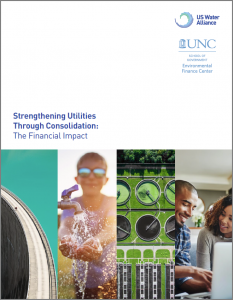Now is a time of growing uncertainty and change in the water sector. Meanwhile, there are tens of thousands of water utilities and authorities in the United States. Collaboration will be essential to securing our nation’s water future. As the adage goes, there’s strength in numbers.
Consolidating water utilities is one of many options communities may consider to pool resources, streamline decision-making, and increase efficiency. While complex, consolidation may be an appropriate consideration when the community value proposition outweighs costs. Leaders need access to more information about the financial effects of consolidating water utility service to assess their options.
To meet that need, the US Water Alliance and the UNC Environmental Finance Center are releasing a new report, Strengthening Utilities through Consolidation: The Financial Impact. This report synthesizes the existing body of evidence and presents eight case studies from communities who have consolidated utilities in different ways and contexts.
“The questions we hear most often from utilities are: what will consolidating do for us economically? Will consolidated utilities be beneficial for us?” said Jeff Hughes, Director of UNC’s Environmental Finance Center. “Through this project, we were able to dive into the many nuanced facets of this question including impacts on customer rates, utility finances, and overall community economic health. I think the diverse models we examine and the specific impacts we document will provide communities interested in these questions new insight into what they might expect as they consider this powerful but complicated management approach.”
“We need to advance common-ground solutions, and building common ground begins with fact-based information,” said Radhika Fox, CEO of the US Water Alliance. “This can be a tough topic, and the Alliance is ready to facilitate those conversations so we can examine all the tools in our One Water toolbox.”



